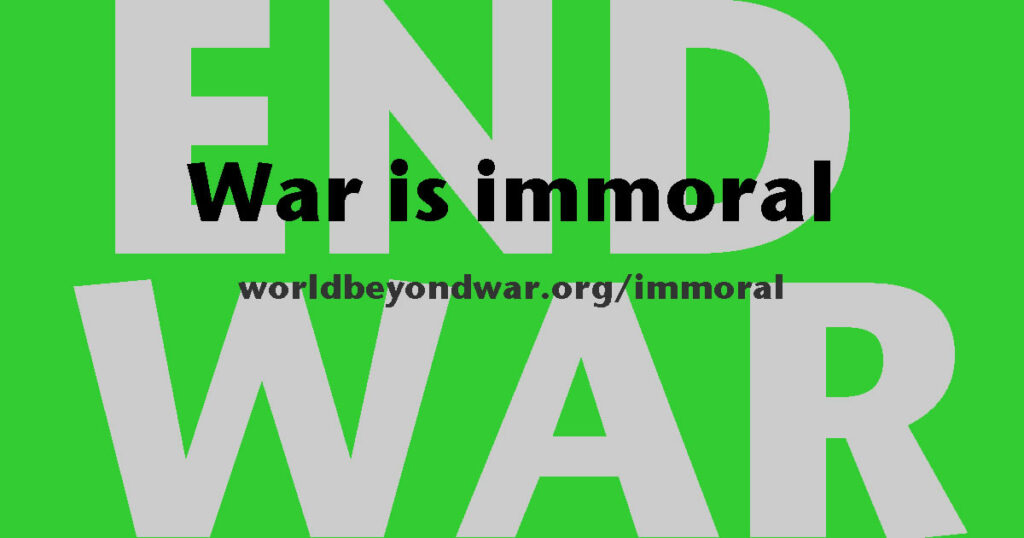Militarism is a major public health threat, a significant cause of death, injury, homelessness, and disease, a completely preventable epidemic that consists of the large-scale killing, wounding, impoverishing, making homeless, orphaning, and traumatizing of people.
If the myths about war were true, if war were inevitable, necessary, beneficial, or just, then we might think of the killing that constitutes war as unlike the smaller scale killings we refer to as murder. Since the myths are not true, we are compelled to agree with Harry Patch, the last surviving soldier of World War I, that “War is organized murder and nothing else.”
War kills primarily through the diversion of resources from where they are needed. It is also a top destroyer of the natural environment, a top eroder of liberties, a top promoter of bigotry, an impoverisher of societies, and an institution that endangers rather than protects. Were a particular war to achieve the impossible and meet the standards of justice on its own, it could still never outweigh all the harm done by the institution of war.
The victims of wars waged by wealthy nations against poor ones are overwhelmingly on one side, and the majority of them civilians by everyone’s definition. The top killer of members of the U.S. military is suicide. War victims are disproportionately the elderly and the very young. In many recent wars, violence has directly caused the most deaths and injuries, but wars also still kill huge numbers of people indirectly through destruction of environments and infrastructure resulting in disease epidemics and starvation.
The victims of wars are far more numerous than is often imagined.
 In the film The Ultimate Wish: Ending the Nuclear Age, a survivor of Nagasaki meets a survivor of Auschwitz. It is hard in watching them meeting and speaking together to remember or care which nation committed which horror. War is immoral not because of who commits it but because of what it is. On June 6, 2013, NBC News interviewed a former U.S. drone pilot named Brandon Bryant who was deeply depressed over his role in killing over 1,600 people:
In the film The Ultimate Wish: Ending the Nuclear Age, a survivor of Nagasaki meets a survivor of Auschwitz. It is hard in watching them meeting and speaking together to remember or care which nation committed which horror. War is immoral not because of who commits it but because of what it is. On June 6, 2013, NBC News interviewed a former U.S. drone pilot named Brandon Bryant who was deeply depressed over his role in killing over 1,600 people:
Brandon Bryant says he was sitting in a chair at a Nevada Air Force base operating the camera when his team fired two missiles from their drone at three men walking down a road halfway around the world in Afghanistan. The missiles hit all three targets, and Bryant says he could see the aftermath on his computer screen—including thermal images of a growing puddle of hot blood.
‘The guy that was running forward, he’s missing his right leg,’ he recalled. ‘And I watch this guy bleed out and, I mean, the blood is hot.’ As the man died his body grew cold, said Bryant, and his thermal image changed until he became the same color as the ground.
‘I can see every little pixel,’ said Bryant, who has been diagnosed with post-traumatic stress disorder, ‘if I just close my eyes.’
‘People say that drone strikes are like mortar attacks,’ Bryant said. ‘Well, artillery doesn’t see this. Artillery doesn’t see the results of their actions. It’s really more intimate for us, because we see everything.’ …
He’s still not certain whether the three men in Afghanistan were really Taliban insurgents or just men with guns in a country where many people carry guns. The men were five miles from American forces arguing with each other when the first missile hit them. …
He also remembers being convinced that he had seen a child scurry onto his screen during one mission just before a missile struck, despite assurances from others that the figure he’d seen was really a dog.
After participating in hundreds of missions over the years, Bryant said he ‘lost respect for life’ and began to feel like a sociopath. …
In 2011, as Bryant’s career as a drone operator neared its end, he said his commander presented him with what amounted to a scorecard. It showed that he had participated in missions that contributed to the deaths of 1,626 people.
‘I would’ve been happy if they never even showed me the piece of paper,’ he said. ‘I’ve seen American soldiers die, innocent people die, and insurgents die. And it’s not pretty. It’s not something that I want to have—this diploma.’
Now that he’s out of the Air Force and back home in Montana, Bryant said he doesn’t want to think about how many people on that list might’ve been innocent: ‘It’s too heartbreaking.’ …
When he told a woman he was seeing that he’d been a drone operator, and contributed to the deaths of a large number of people, she cut him off. ‘She looked at me like I was a monster,’ he said. ‘And she never wanted to touch me again.’
##











13 Responses
This is poorly written.
I agree with some of your points but not all of them. War is not always waged by the wealthy nations only.
En general coincido con sus apreciaciones, aunque debería considerar el factor “dinero”. Las grandes fortunas son las que controlan el mundo y seguro que tienen mucho que decir sobre la causalidad de las guerras.